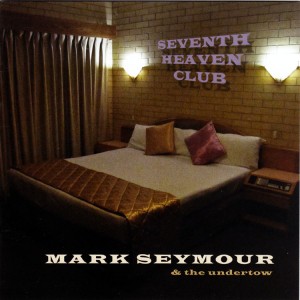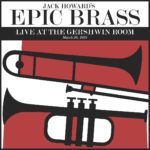Mark Seymour & The Undertow – Seventh Heaven Club
![]()
Mark’s sixth solo album, a collection of covers of Mark’s favourite love tunes.
Released In: [Australia / NZ].
Release Date: 1 March 2013.
Australian Chart Position: #116 (ARIA).
Availability: Moderately common. Available new in CD and digital form.
Value: A$15-A$30.
Legend:
![]() Commercial single.
Commercial single.
![]() Promotional single.
Promotional single.
Version: Liberation Records Australian CD album.
Album length: 48 minutes, 23 seconds.
ReplayGain loudness: -8.62dB (2013).
- Lorelei (featuring Hannah Seymour)

- Getting Over You (featuring Abby Dobson)

- Can’t Wait
- Sorrow
- Beside You

- Caroline (featuring Hannah Seymour)
- Late For The Sky
- Counting On You
- Come On (featuring Lucinda Williams)
- Only Love Can Break Your Heart (featuring The Carnegie Tabernacle Choir)
- It Makes No Difference
- These Arms Of Mine
Official promotion:
The ‘Seventh Heaven Club’ is the 9th solo album from Mark Seymour since his legendary Australian band the ‘Hunters & Collectors’ disbanded.
On the album you will hear love songs collected over the last 14 years that Mark has played alone and with his band ‘The Undertow’.
They were chosen for their honesty, their eloquence and the determination to prove that lyrics matter.
Songs from Lucinda Williams (who also features on the album), Neil Young, Tom Petty, Robbie Robertson, Bob Dylan and many more.
“Lorelei” was a German beauty who lost the love of her life in the icy waters of the Rhine. In her grief she swore vengeance on the river and all who sailed on it. She cried out from the cliff-top, combing her long hair seductively, determined to lure them to their deaths on the rocky shore.
The story of “Lorelei” has been told many times in song. I first heard The Pogues’ version 16 years ago, fresh from the cloister of Hunters and Collectors and looking for clues. Written by Phillip Chevron, it tells the sailor’s version of the yarn, sailing down the river to the sea, home to his loved one but running the gauntlet of temptation, made real by the seductive vision of Lorelei calling from the rocky shore. The sailor is flawed, weakened by longing. We are drawn to his condition because we relate to his frailty. We care because his story is about us.
“Lorelei” was one of many love songs I’ve turned to when there was nobody else in the room. How do songwriters work in solitude? “Lorelei” demonstrates how Chevron looked outside himself and found a way of conveying feeling on a scale more easily shared because it borrowed from history and myth.
Love songs let us share our humanity. Love songs are more than testaments to strong emotion. They are stories people react to and make their own…
Songwriters know that we care, they know we want sexual intimacy to be justified, our frailty explained. We want complexity made simple, lust to be sanitized by romance, betrayal written in the empty sky, or we want the whole shooting match, lust, possession, indifference, machismo taken down by femininity:
“You think you’re in hot demand But you don’t know where to put your hand Let me tell you where to stand You didn’t even make me, come on!” (Lucinda Williams)
or the other way round, depending on your mood…
“Do you ever lay awake at night,
your face turned to the wall
Drowning in your thoughtlessness
Cut off from it all
I don’t know maybe for you it’s not that late
But as for me don’t know how much longer
I can wait” (Bob Dylan)
Naturally songwriters milk the landscape of love for all it’s worth because, let’s face it, it’s worth a lot. History proves this. Love songs define popular music. The good, the bad and the even worse. Love songs are fickle. To write one is to risk everything, or nothing at all. They either work or they don’t. When they don’t, they screech at us like fingernails down a black board…
“Loving you is easy ‘cos you’re beautiful” (Minnie Riperton)
Yeah sure… But what if I change and you get hit by a bus? That line always sounded like a crock to me. Sing it in white if you must but not everybody lives in the light.
Love songs are never innocent, and writing them can be a highway to self-indulgence. Some songwriters will claim that their artistic success lies in their ability to write from the point of view of the ‘character’ or the ‘protagonist’ as though they have some unique ability to distance themselves from the theatre of their own work and thereby avoid any suggestion that their own dirty laundry might be just as inspiring to them as the loftier claim that their songs are connected with higher truths than their own. It’s a neat argument if you can make it stick. But when it comes to love songs, it rarely does. Love songs are meant to be personal. That’s why they work. It takes great courage to write them well. Dirty laundry can be a fearful thing and punters are bound to speculate.
A great love song hits the nerve of piquancy and will become public property sooner or later, regardless of how much cash is thrown. Great love songs sound personal, but really, they are telling stories that are already written into the circuitry of human life, the great struggle between intimacy and independence, stories that accommodate complexity because they do not pretend to solve the drama. They merely depict the reality of human frailty and so are accepted, inherited, depicted on the walls of caves and palaces, sung to the lyre and the Fender guitar, in churches and into Protools, passed down the centuries through literature, film and art.
And there is always the story; where the personal is elevated onto the widescreen of common experience.
Notions of romantic love, of soul kinship, the belief that there is the ‘special’ one out there, the prince, the rescuer, or on the flip side, the idea so common in traditional country music that “men never stay”; or Eve the temptress, whose yearnings lead weak men to stray. These ideas have been passed down through history and affected by it, adjusted and tweaked to suit the sensibilities of the time. To say that they are ‘true’ would be to dumb them down; they are narrative ideas that songwriters return to because they evoke intense feeling. They are navigational markers in the struggle and bewilderment of sexual intimacy.
“You gotta believe that there’s a reason
That we surrender up our hearts
But there’s a vantage point and it takes some time to find
Where you can see how all the pieces fit as you watch ’em fall apart”
(Bonnie Raitt and Willie Nelson)
How personal is this? How deeply felt? At what point do songwriters begin to explain their own behaviour by casting it onto the wider stage? Where does the fiction begin and where does it end? How real is the story telling?
There may be a clue in the singing of it, full voiced, because if there is one certain truth in all of this, the songwriter has done that very thing at some point, with the notepad on the table, and the guitar held close to the chest…
Songwriting takes place in parallel with life. Melody and words ferment in the mind while you chop the wood. Songs are a link between dreams hidden by the surface of things and real experience. Great love songs always speak from that place. Every one is a message. It’s good to listen, as randomly as possible. Musical ‘clues’ spring from anywhere…
I noticed “Late for the Sky” while watching the Scorsese film, “Taxi Driver”.
“Looking hard into your eyes
There was nobody I’d ever known
Such an empty surprise to feel so alone”
It hit a nerve, the plaintive tone and that yearning guitar work. I looked it up; Jackson Browne, a bloke I would’ve shrugged at back when I moved in more fashionable circles but now, in a new context, my own solitude enforced by circumstance, watching De Niro kick the TV over, I heard something brutally eloquent. The song was a very powerful statement of isolation and abandonment, born of its’ very opposite; an insatiable need for intimacy.
Johnette Napoletano’s “Caroline” is rich in fleeting detail…
“like a sad hallucination
when I opened up my eyes
the train had passed the station
and you were trapped inside
and I never wondered where you went,
I only wondered why, I wondered why”
Again intimacy has occurred but now only glimpsed on the fly from a railway platform as a lover’s face rushes past. We see the distance open up between comfort and death. Abandonment crashes through to fill the space.
All the tunes on “Seventh Heaven Club’ have been pins on a map for me. They have served a purpose at one time or another, a way forward in the singing of them to a place where I could locate my own feeling in new material. They are about yearning, loss, loyalty and joy, the debris of love strewn through to reveal a simplicity and truth that I’ve come to recognize as greatness.
I met Dave Dobbyn not long after he’d released “Islander” in 1998, which was coincidentally, the year Hunters and Collectors retired. I’d approached him to cowrite. My career was winding down. I needed inspiration and I was deeply impressed with the tune “Beside You”. Dave wrote about loyalty and devotion. There was no denying it. Dave had written about himself, and turned his courage on the head of a pin. The notion of ‘loyalty’ really hit me hard. There was nothing flash here, nothing ‘erudite’. This tune was deeply felt. I had to sing it.
“Songwriting is a battle with the psyche” he said.
A love song is genuinely moving when it brings dreams into consciousness, to a place we claim as our own. Great love songs offer us a way out of ourselves and into our common humanity.
On “Seventh Heaven Club” you will hear love songs collected over the 14 years that I’ve played alone and with “The Undertow”. They were chosen for their honesty, their eloquence and the determination to prove that lyrics matter.
Mark Seymour and The Undertow:
Mark Seymour: Vocals, rhythm guitar
Cameron McKenzie: Guitars, vocals
John Favaro: Bass, vocals
Peter Maslen: Drums, vocals
Produced and mixed by Cameron McKenzie
Initial recording engineered by Damien Young at Pony Studios,
South Hallam Road, Hallam, July 2012
Further recording and mixing at Station Place, Glenhuntly
Guest singers: Lucinda Williams, Abby Dobson, Hannah Seymour
Guest keyboardist: Jake Mason
The Carnegie Tabernacle choir: John Flynn, Sarah Gurry, Abby Dobson, Craig Johnston, Mal Pinkerton, Michael Allen, Sam Boyden, Diana Glenn
Live sound: Rob Miles
Lucinda’s voice recorded by Eric Liljstrand
Crew: Stan Armstrong, Chris Rodgers, Cam Batten
Art Direction/Photography: Stuart Spence
Artwork: Jo Vautier
Merchandise: Suzi Dhnaram
Loud & Clear Management: loud@optusnet.com.au
Michael Roberts
Phoebe Callow
Laura Ferguson
Special thanks to my loved ones Jo, Eva and Hannah for sharing the load, to Nick for letting me use the Killy Gaff and all at Liberation Music for staying the course.
We dedicate these songs to the memory of Kate Bentley






